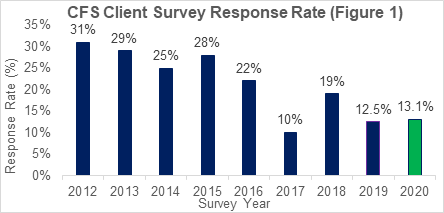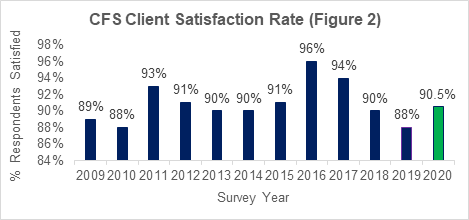2020 Client Satisfaction Survey Report - Executive Summary
Introduction
The Centre of Forensic Sciences (CFS) provides high quality forensic scientific laboratory services to support the administration of justice and public safety programs across Ontario. The CFS provides forensic science services in four main areas: Biology; Toxicology; Chemistry and Physical Sciences (Firearms and Toolmarks & Documents). CFS clients include police, coroners, pathologists, crown attorneys, defence attorneys, fire investigators and official investigative agencies.
The CFS has measured client satisfaction annually since 2000. Obtaining client feedback is an ISO 17025 accreditation requirement the CFS must adhere to and is a key performance measure that the CFS reports on annually through the multi-year business planning process. The client survey is used to evaluate the performance of the CFS against the organizational commitment to provide high quality forensic laboratory services in support of the administration of justice and public safety programs for all Ontarians.
Overview
On February 9, 2021, 6,953 invitations to participate in the survey were successfully delivered through the SurveyMonkey platform to all clients who utilized CFS services, made a case submission to the CFS or received a CFS report in 2020. The CFS received 911 survey responses, which is a response rate of 13.1%. The slight increase from the 2019 response rate of

12.5% could be due to changes made to the sampling approach (Figure 1).
In 2020, majority of survey respondents were police officers (74.6%), followed by Coroners (9.2%), Crown Attorneys (5.8%), Defense Attorneys (3.4%), Forensic Pathologists (1.4%), Fire Investigators (1%) and those identified as ‘other’ (4.5%).
Overall client satisfaction with the quality of services provided by CFS is one of the broader performance measures that the CFS annually reports to the Ministry of the Solicitor General. In 2020, the overall client satisfaction rate was 90.5%, which is a 2.5 percentage point increase from the 2019 satisfaction rate of 88% (Figure 2).

Questions
In the 2020 CFS survey, clients were asked questions about their level of satisfaction with CFS staff and the quality, range and importance of CFS services outlined below:
- Assistance provided by CFS staff
- Amount of time taken to receive a response from CFS staff
- CFS staff scientific responses to client technical questions
- Online Evidence Submission System
- Laboratory reports (e.g., easy to understand, thorough and provide enough detail)
- Training (e.g., training meets needs, range of training opportunities, quality training)
- Has the CFS Client Training Portal been visited
- Has the CFS Research and Development (R&D) Portal been visited
- The client engagement question was revised to ask clients, if they would be interested in participating in Town Halls and/or One on one Interviews in addition to Focus Groups.
- A new question was included asking if the client had consulted with CFS staff directly
- The 2020 survey was expanded to include a comment field after each question, which encouraged feedback from respondents.
2020 Survey Response Highlights
- In 2020, 90% of respondents were satisfied that the range of CFS services were meeting their needs. Many comments highlighted how much they appreciate CFS staff and the work they do.
- In 2020, respondents ranked the importance of CFS services. Similar to 2019, Ease of Evidence Submission remained ranked as the most important CFS service, followed closely by the Quality of Reporting. In the 2020 survey, Quality of Reporting and Quality of Communication were separated which enabled respondents to rank these services separately. Timeliness of Service was ranked as the third most important measure, followed by Quality of Communication and Training Opportunities.
- 77.1% of respondents stated they had directly consulted with a CFS staff member.
- In 2020, key client satisfaction rates with the following measures increased from 2019. Satisfaction rate with assistance from CFS staff was 92% (4 percentage point increase); satisfaction with time to respond to inquiries satisfaction was 88% (10 percentage point increase); satisfaction with scientific responses to technical questions was 91% (15 percentage point increase). Respondents provided many positive comments about the high-quality services provided by the CFS.
- In 2020, 69% of respondents said they were satisfied with the CFS Online Evidence Submission system. This is a 7 percentage point decrease in comparison to the 2019 satisfaction rate of 76%.
- Satisfaction rates with CFS Laboratory reports increased in 2020. 75% of respondents felt reports are easy to understand; 86% said reports are thorough and 82% agreed that reports provide enough detail. Similar to 2019 comments, ensuring that reports are easy to understand continues to be an area for improvement for the CFS.
- Client knowledge of, and satisfaction with CFS training remains low, similar to 2019 survey results. For 2020, 27% of respondents were satisfied that the training was meeting their needs; 15% were satisfied with the range of training opportunities provided and 24% were satisfied with the quality of training provided.
- Use of both the CFS Client Training and Research & Development Portals is low: 14% of respondents said they had visited the CFS Client Training Portal, while 7% of respondents said they had visited the CFS Research & Development Portal.
- 63.1% of respondents said they were interested in participating in Focus Groups, 41.5% were interested in Town Halls and 50.8% were interested in One-on-One Interviews.
- In 2020, the CFS received 1,408 survey comments. The questions that received the most amount of respondent comments include: Quality of CFS Services; CFS Training; Satisfaction with CFS staff assistance; Online Evidence Submission System; Importance of CFS services and Client engagement opportunities.
Next Steps
The CFS is committed to client engagement and identifying opportunities to improve client satisfaction. Efforts to obtain and address client feedback include:
- Using the CFS Client Outreach Strategy by holding Client Town Halls, Focus Groups and One-on-One Interviews.
- Working to optimize clients’ ease of access to CFS information and resources.
- Using client feedback from Training Evaluation Forms to inform changes to CFS training.
- Using client feedback to inform changes to the Online Evidence Submission System.

